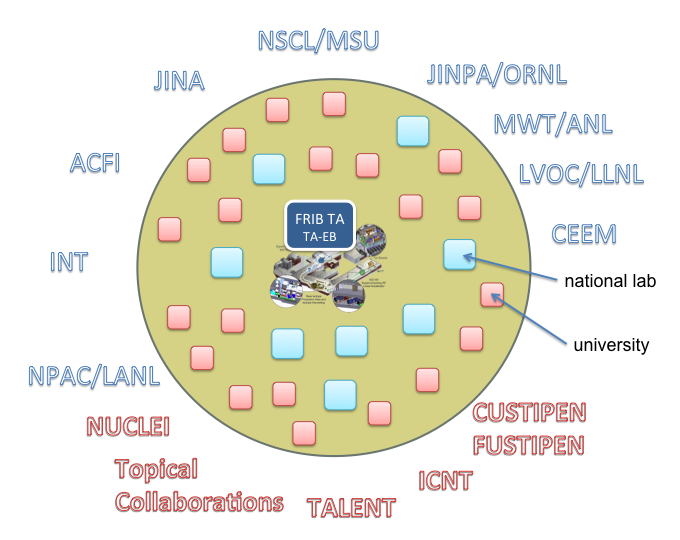What is the FRIB Theory Alliance (FRIB-TA)?
The FRIB Theory Alliance (FRIB-TA) is a coalition of scientists from universities and national laboratories who seek to foster advancements in theory related to diverse areas of FRIB science; optimize the coupling between theory and experiment; and stimulate the field by creating permanent theory positions across the country, attracting young talent through the national FRIB Theory Fellow Program, fostering interdisciplinary collaborations, and shepherding international initiatives.

Nuclear physics pervades the vast history of the universe and is vital to our understanding of where we came from and how we got here. Together with the experiments at the Facility for Rare Isotope Beams (FRIB), the FRIB-TA addresses the overarching questions identified by the National Academy of Science in the fourth decadal survey of nuclear physics, Exploring the Heart of Matter. Low-energy nuclear theory and related areas such as astrophysics and fundamental symmetries, coupled to computational science, play a critical role in answering the overarching questions. The ultimate goal of the FRIB-TA is to maximize the scientific impact of FRIB.
A successful experimental program at FRIB is tightly interwoven with advances in theory. A theoretical assessment of the scientific impact of experiments can help identify critical measurements by studying the theoretical relevance of the anticipated experimental outcomes. Theory can also evaluate whether the anticipated experimental uncertainties are adequate to provide meaningful guidance to theory. Theory should provide input for planning future experiments by isolating observables that are crucial to model developments, and validating and verifying model-based extrapolations. The FRIB Theory Alliance, working closely with FRIB experimentalists, will facilitate interactions on topics relevant to current and future FRIB science.
The benchmark scientific programs introduced in 2007 by the NSAC Rare-Isotopes Beam Task Force to quantify the capability of a future rare isotopes facility are representative of the type of physics that can be pursued at FRIB. Each of these benchmarks can be associated with theoretical developments that need to take place for the success of those key programs and demonstrates the vast array of theoretical developments that must accompany the core experimental program of FRIB. In addition to these benchmarks, theory will be essential in discoveries, providing insight to new results from experiment, leading to avenues not anticipated today.
The FRIB-TA goes beyond the traditional fields of nuclear structure and reactions, and nuclear astrophysics, and explores exciting boundaries with other areas. Computational science has become an essential part of ongoing nuclear physics research, and the FRIB-TA will provide support to initiatives taking advantage of high-performance computing. The FRIB-TA will play an important role in communicating the science and reaching out to other fields and communities. The FRIB-TA will also coordinate an educational program for training the next generation in advanced nuclear theory.